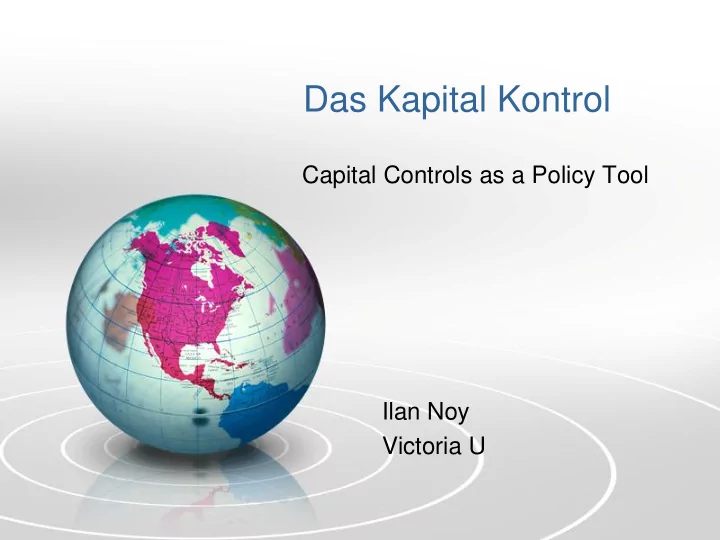

Das Kapital Kontrol Capital Controls as a Policy Tool Ilan Noy Victoria U
The Trilemma
Aizenman, Chinn and Ito (2011) The trilemma as a continuous trade-off rather than a set of binary choices
A Brief History of Capital Controls • The Gold Standard (1870s-1914) • The Bretton-Woods Era (1950s-1971) • The liberalization of the 1980s-90s (Washington Consensus) • “Good - bye financial repression, hello financial crash” • Surprise! the Asian Crisis of 1997-8. • Good-bye Washington Consensus, hello Washington confusion… • The 2008 GFC: a flood of capital controls » Brazil, Colombia, Indonesia, Korea, Taiwan, Thailand, Turkey, and Peru » Involuntary controls in Iceland and (future?) Greece » Heavy exchange market interventions (Japan, Israel and Switzerland)
Types of Capital • Long or short • Equity or debt • Public or private • Denomination and original sin
Typology of Controls • Outflows vs. inflows • Debt vs. equity flows • Quantity vs. price (tax) controls • Exchange controls
Farhi and Werning (2012) • “ the optimal use of capital controls depends crucially on the nature of the shock, on the stickiness of prices, and on the openness of the economy….”
The Pros of Controls • The trilemma constraints • Preventing Sudden Stops (macro-prudential) • Preventing undesired appreciations • Preventing inflationary pressures (asset prices). • Fiscal needs • Cheap financing for domestic investment
A Prophylactic against Financial Crises • Fisherian Debt deflation • Bernankian Financial accelerator • Stiglitzian Pecuniary externality
The Cons of Controls • Distorted incentives (mis-allocation of saving) • Inability to smooth consumption during downturns • Dead-weight losses and opportunities for corruption • Unintended consequences • Very difficult to implement successfully
The Salt-Water Mainstream View Today • Prudential capital controls only • No ex-post interventions on capital outflows • Capital controls are not an efficient way to finance fiscal needs • Little support for the use of controls as a mercantilist tool to stabilize the exchange rate.
The IMF View Today with backlash from emerging markets…
Evidence-Based Policy • What are the macroeconomic impacts of capital flows? • What is the impact of capital controls on the economy? • What is the impact of capital controls on capital flows?
Impact of Capital Flows on Economy? • Evidence is not straight forward • Benefit only above an institutional threshold • More trade with more capital flows • More robust findings in micro-data – Technological spill-over from FDI – Large firms less credit constrained (not true for SME)
Impact of Capital Controls on Economy? • Very little robust evidence • Some evidence that capital controls do not reduce the risk of financial crises
Impact of Capital Controls on Capital Flows? Investor Survey (fund managers) “remarkable range of views” Most negative: “a draconian policy” Most positive: “making a country more attractive” And in practice: “did not materially affect their portfolio allocations” “adjustment will only happen over time” The most consistent response emphasized the signalling nature of controls
Jinjarak, Noy and Zheng (2012)
Jinjarak, Noy and Zheng (2012) Brazil during the GFC and the IMF recipe
Brazil: IOF ( imposto sobre operações financeiras) • March 2008: 1.5% • October 2008: 0.0% • October 2009: 2.0% • October 2010: 6.0% • January 2011: 2.0%
Episode 1
Episode 2
Episode 2 - placebos
Episode 3
Episode 4 • In case you are bored….same non -results as in episode 3….
Episode 5
Episode 5
Summary • The capital controls in Brazil were not very effective in curbing capital inflows. • The only significant effect was when controls were relaxed, and inflows surged in. • A signalling explanation. • A question of size (tax rates were small).
Practical Issues • Price controls or quantity controls – Equivalent only for a rep agent economy • Taxing stocks or flows – Normative vs. practical • Off-the-shelf policy tools • What about controls on outflows? • Global coordination and international treaties » Bubble-thy-neighbour effects
Some relevant literature • Aizenman, Chinn and Ito (2012) • Costinot, Lorenzini and Werning (2011) • Farhi and Werning (2012) • Forbes, et al. (2012) • Glick, Guo and Hutchison (2006) • Jeanne (2012) • Jinjarak, Noy and Zheng (2012) • Joyce and Noy (2008) • Korinek (2011) • Noy and Vu (2007)
Questions?
Recommend
More recommend